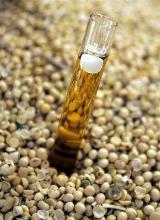
 |
|||||||||

|
Facts About Biodiesel
What is biodiesel? Biodiesel is the name given to a variety of fuels made from vegetable oils or animal fats. The diesel engines of today require a clean-burning, stable fuel that will performs well under many different operating conditions. Biodiesel is the only alternative fuel that can be used directly in any unmodified diesel engine. Because it has properties similar to petroleum diesel fuel, it can be blended in any ratio with regular diesel fuel.
What are the advantages of biodiesel? ENVIRONMENTAL: Biodiesel is environmentally friendly. It has fewer emissions than standard diesel, is biodegradable, and is a renewable source of energy. It is biodegradable, meaning that it can decompose as the result of natural agents such as bacteria. According to the EPA, biodiesel degrades at a rate four times faster than conventional diesel fuel. Thus, in the event of a spill, the cleanup would be much easier and the aftermath much less frightening than conventional diesel. And, biodiesel reduces toxic emissions – a factor of primary importance to most city and state governments. NATIONAL SECURITY: Biodiesel is a sustainable, renewable resource that is grown domestically. It can help reduce dependency on imported, foreign oil and increase energy security. MECHANICAL: Biodiesel can be used in almost any diesel with little or no engine modification. It helps to lubricate the engine itself, decreasing engine wear. It has high detergent properties keep fuel lines, injectors, and combustion chambers clean. It acts as a solvent, which helps to loosen deposits and other gunk from the insides of an engine that could potentially cause clogs. It contains no sulfur, which reduces soot clogs in vehicles with exhaust gas recirculation. And, since pure biodiesel leaves no deposits of its own, it results in increased engine life. The U.S. DOE, Office of Transportation Technology estimates that a biodiesel blend of just 1% could increase fuel lubricity by as much as 65%! SAFETY: Biodiesel is safer than conventional diesel. It is non-toxic. In fact, it is about 10 times less toxic than simple table salt. It has a higher flashpoint than conventional diesel, and thus is less likely to accidentally combust. This makes biodiesel movement and storage regulations much easier to accommodate. ECONOMIC: Biodiesel keeps money in the domestic economy, instead of sending it to other countries. It provides domestic jobs, both in farming and in production.
|
|||||
www.apinnovations.com
®2007 |
||||||